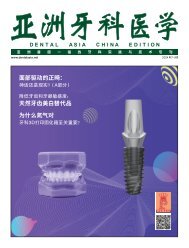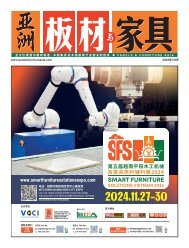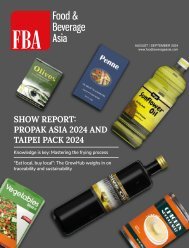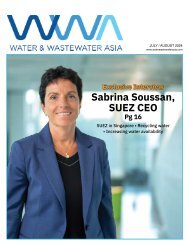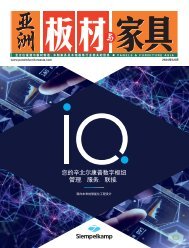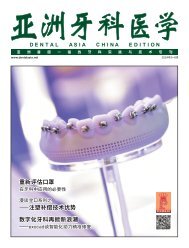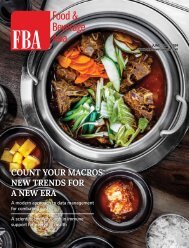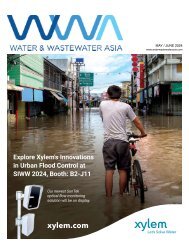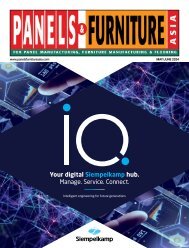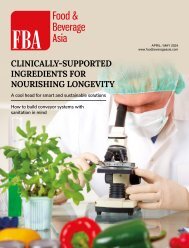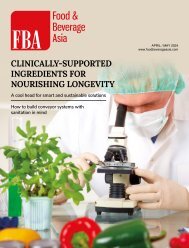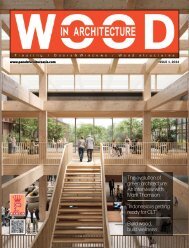Water & Wastewater Asia May/June 2019
Water & Wastewater Asia is an expert source of industry information, cementing its position as an indispensable tool for trade professionals in the water and wastewater industry. As the most reliable publication in the region, industry experts turn this premium journal for credible journalism and exclusive insight provided by fellow industry professionals. Water & Wastewater Asia incorporates the official newsletter of the Singapore Water Association (SWA).
Water & Wastewater Asia is an expert source of industry information, cementing its position as an indispensable tool for trade professionals in the water and wastewater industry. As the most reliable publication in the region, industry experts turn this premium journal for credible journalism and exclusive insight provided by fellow industry professionals. Water & Wastewater Asia incorporates the official newsletter of the Singapore Water Association (SWA).
You also want an ePaper? Increase the reach of your titles
YUMPU automatically turns print PDFs into web optimized ePapers that Google loves.
MYANMAR WATER PORTAL | 17<br />
Working towards a Resilient Yangon, uncovering the<br />
water needs and challenges in Thaketa township<br />
Since October 2018 a coalition of Dutch<br />
water organisations has been working<br />
together in the ‘Urban <strong>Water</strong> Logistics<br />
for a Greater Yangon’ (UWLY) programme to<br />
support the Yangon Regional Government in<br />
Urban <strong>Water</strong> and <strong>Water</strong> Logistics Challenges.<br />
Set to run for three years as part of the Dutch<br />
government’s “Partners in Business” (PIB)<br />
programme, the UWLY programme’s first<br />
deliverable is to present a scoping study.<br />
The study should provide locally grounded,<br />
inspirational and practical insight into what<br />
a water-resilient Yangon could look like at a<br />
township level. Upon request of the Yangon<br />
Regional Government the selected township<br />
was Thaketa, located east from central and<br />
downtown Yangon.<br />
PREPARATIONS FOR THE SCOPING<br />
OF YANGON AS WATER RESILIENT<br />
CITY<br />
As part of the scoping study, the team<br />
undertook several activities to gain a better<br />
understanding of the local water conditions<br />
in the Thaketa township. Several consultation<br />
sessions were held with the Yangon City<br />
and Regional Government and the Yangon<br />
City Development Committee (YCDC) to get<br />
a better understanding how the Thaketa<br />
township is governed, and what the local<br />
challenges are to ensure efficient water<br />
management. In addition to this, several<br />
preparatory consultations took place with<br />
local stakeholders in the township.<br />
Based on this initial analysis<br />
a field visit to Thaketa<br />
was planned. From 4 to 8<br />
March, eight experts from<br />
different organisations of the<br />
consortium visited Yangon to<br />
get a feel for the issues and<br />
opportunities. Representatives<br />
from the Dutch Embassy in<br />
Yangon, Witteveen+Bos, Royal<br />
HaskoningDHV, U Minds, Doh<br />
Eain, Resilience and The <strong>Water</strong><br />
Agency visited the township<br />
for two days and presented<br />
Variation in how the water<br />
reaches the houses<br />
their initial observations afterwards.<br />
The objective of the trip was to perform<br />
an urban water needs assessment of local<br />
stakeholders in the Thaketa township. The<br />
aim was for the delegation to get a good<br />
understanding of the area, visit the township<br />
for observations and consultations with<br />
citizens, business owners, local authorities,<br />
etc. to serve as input for the Resilient Yangon<br />
Scoping Study.<br />
After initial introductions and prioritisation,<br />
the delegation had its first field day on March<br />
5, visiting several wards in the township. With<br />
great support and guidance of the YCDC<br />
Thaketa team and the local Ward officers,<br />
the delegations visited several locations<br />
where water issues were known to arise.<br />
In the afternoon the focus was on Ward 5,<br />
which is a ward that is isolated from the<br />
water pipeline network. It served as a great<br />
showcase for the experts to learn more on<br />
innovate ways of water supply. With the<br />
support of Ward 5 Officer U Tin Htun Aung a<br />
public consultation session was organised,<br />
inviting local inhabitants to share about their<br />
struggles and experiences with water in the<br />
ward. On the second field day there was a<br />
specific focus on Ward 7, walking through the<br />
ward and meeting with several inhabitants.<br />
Some observations from the field trip:<br />
Variation in the how the water reaches the<br />
houses<br />
The water supply in Thaketa was seen to be<br />
varied, and where ward 7 was<br />
well connected to the YCDC<br />
pipeline, ward 5 inhabitants<br />
were dependent on their own<br />
water supply. The coalition’s<br />
experts identified several ways<br />
of getting water to the homes:<br />
from the pipeline, the lake, the<br />
tubewell or through buying<br />
bottled water.<br />
THE STRUGGLE TO KEEP<br />
THE DRAINAGE CLEAN<br />
All over the wards small drainage<br />
canals exist that lead to main outlets in either<br />
the Bago river or the Panzundaung creek.<br />
Experts found that despite a waste collection<br />
system in place, many of the drainage canals<br />
are blocked. Both Ward officers shared their<br />
struggles to keep the canals free, having to<br />
perform manual maintenance at least three<br />
times in the year. Especially before the start<br />
of the rainy season there is a high urgency<br />
to clean up, as clogged drainage will lead to<br />
flooding of the streets.<br />
What was remarkable was that the team<br />
learned, through conversations with<br />
inhabitants, that there were variations in<br />
what people considered as flooding – flooding<br />
issues that the team felt would be areas of<br />
concern were not mentioned by the people<br />
they spoke to, and to the locals a flood was<br />
only when water stayed in the streets for<br />
multiple hours.<br />
The observations and initial analysis of the<br />
Field Trip were shared to the YCDC in a<br />
presentation on the final day of the Field Trip,<br />
also serving verification purposes. The next<br />
step in the Urban <strong>Water</strong> programme will be<br />
to deliver the Scoping Study. Based on the<br />
observations, consultations and findings of<br />
this visit, a scoping of Yangon as a <strong>Water</strong><br />
Resilient City will be prepared together with<br />
ambitions and tangible objectives.<br />
The UWLY programme will be expected to<br />
organise a workshop in summer this year, for<br />
all stakeholders to present and discuss the<br />
way forward. WWA<br />
Drawing and photo credits to Flore Bijker.<br />
<strong>Water</strong> & <strong>Wastewater</strong> <strong>Asia</strong> • <strong>May</strong> / <strong>June</strong> <strong>2019</strong>




